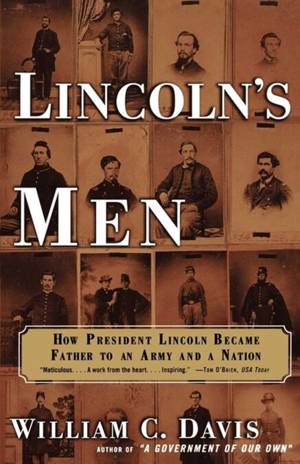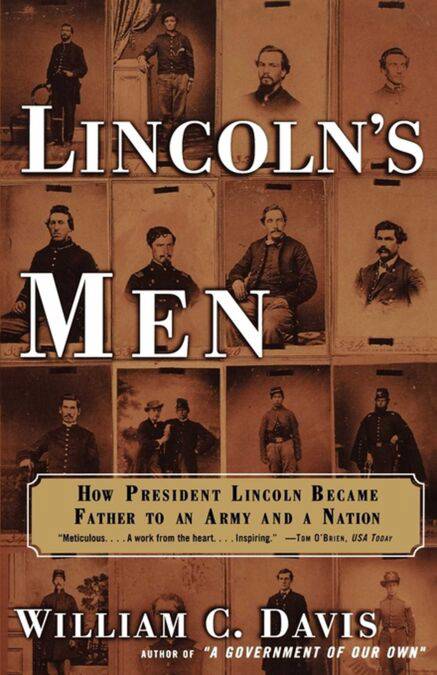
- Afhalen na 1 uur in een winkel met voorraad
- Gratis thuislevering in België vanaf € 30
- Ruim aanbod met 7 miljoen producten
- Afhalen na 1 uur in een winkel met voorraad
- Gratis thuislevering in België vanaf € 30
- Ruim aanbod met 7 miljoen producten
Zoeken
Lincoln's Men E-BOOK
How President Lincoln Became Father To an Army an
William C. Davis
E-book | Engels
€ 17,88
+ 17 punten
Uitvoering
Omschrijving
I sit down to write you (a Soldier's Friend!)...My kind Friend of Friends you have the power to help me a grate deal...I have great Confidence in our Good President hoe has dun a grate deal for us poor Soldiers...
So wrote Private Joe Hass to Abraham Lincoln, February 20, 1864. Like an extraordinary number of his fellow Union soldiers, he loved Lincoln as a father. Lincoln inspired feelings unlike those instilled by any previous commander-in-chief in America. In Lincoln's Men, William C. Davis draws on thousands of unpublished letters and diaries to tell the hidden story of how a new and untested president could become "Father Abraham" throughout both the army and the North as a whole.
How did the Army of the Potomac, yearning for the grandeur of McClellan, turn instead to the comfort of Old Abe, and how was this change of loyalty crucial to final victory? How did Lincoln inspire the faith and courage of so many shattered men, wandering the inferno of Shiloh or entrenched in the siege of Vicksburg? Why did soldiers visiting Washington feel free to stroll into the White House and sit down to relax, as if it were their own home?
Davis removes layers of mythmaking to recapture the moods and feelings of an army facing one of history's bloodiest conflicts. Tracing the popular fate of decisions to invoke conscription, to fire McClellan, and to free the slaves, Lincoln's Men casts a new light on our most famous president -- the light, that is, of the peculiar mass medium that was the Union Army. A motley band of talkers and letter writers, the soldiers spread news of Lincoln's appearances like wildfire, chortling at his ungainly posture in the saddle, rushing up to shake his hand and talk to him. The volunteers knew they could approach "Old Abe," "Honest Abe," "Uncle Abe," and "Father Abraham," and they cheered him thunderously. "The men could not be restrained from so honoring him," said Private Rice Bull. "He really was the ideal of the Army."
The story of the making of Father Abraham is the story of America's second revolution, its rebirth. As one Union soldier and journalist put it, "Washington taught the world to know us, Lincoln taught us to know ourselves. The first won for us our independence, the last wrought out our manhood and self-respect."
So wrote Private Joe Hass to Abraham Lincoln, February 20, 1864. Like an extraordinary number of his fellow Union soldiers, he loved Lincoln as a father. Lincoln inspired feelings unlike those instilled by any previous commander-in-chief in America. In Lincoln's Men, William C. Davis draws on thousands of unpublished letters and diaries to tell the hidden story of how a new and untested president could become "Father Abraham" throughout both the army and the North as a whole.
How did the Army of the Potomac, yearning for the grandeur of McClellan, turn instead to the comfort of Old Abe, and how was this change of loyalty crucial to final victory? How did Lincoln inspire the faith and courage of so many shattered men, wandering the inferno of Shiloh or entrenched in the siege of Vicksburg? Why did soldiers visiting Washington feel free to stroll into the White House and sit down to relax, as if it were their own home?
Davis removes layers of mythmaking to recapture the moods and feelings of an army facing one of history's bloodiest conflicts. Tracing the popular fate of decisions to invoke conscription, to fire McClellan, and to free the slaves, Lincoln's Men casts a new light on our most famous president -- the light, that is, of the peculiar mass medium that was the Union Army. A motley band of talkers and letter writers, the soldiers spread news of Lincoln's appearances like wildfire, chortling at his ungainly posture in the saddle, rushing up to shake his hand and talk to him. The volunteers knew they could approach "Old Abe," "Honest Abe," "Uncle Abe," and "Father Abraham," and they cheered him thunderously. "The men could not be restrained from so honoring him," said Private Rice Bull. "He really was the ideal of the Army."
The story of the making of Father Abraham is the story of America's second revolution, its rebirth. As one Union soldier and journalist put it, "Washington taught the world to know us, Lincoln taught us to know ourselves. The first won for us our independence, the last wrought out our manhood and self-respect."
Specificaties
Betrokkenen
- Auteur(s):
- Uitgeverij:
Inhoud
- Aantal bladzijden:
- 336
- Taal:
- Engels
Eigenschappen
- Productcode (EAN):
- 9780684823515
- Verschijningsdatum:
- 13/07/1999
- Uitvoering:
- E-book
- Beveiligd met:
- Adobe DRM
- Formaat:
- ePub

Alleen bij Standaard Boekhandel
+ 17 punten op je klantenkaart van Standaard Boekhandel
Beoordelingen
We publiceren alleen reviews die voldoen aan de voorwaarden voor reviews. Bekijk onze voorwaarden voor reviews.











